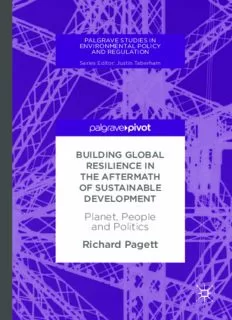
Building global resilience in the aftermath of sustainable development : planet, people and politics PDF
Preview Building global resilience in the aftermath of sustainable development : planet, people and politics
PALGRAVE STUDIES IN ENVIRONMENTAL POLICY AND REGULATION Series Editor: Justin Taberham BUILDING GLOBAL RESILIENCE IN THE AFTERMATH OF SUSTAINABLE DEVELOPMENT Planet, People and Politics Richard Pagett Palgrave Studies in Environmental Policy and Regulation Series editor Justin Taberham London, UK The global environment sector is growing rapidly, as is the scale of the issues that face the environment itself. The global population is estimated to exceed 9 billion by 2050. New patterns of consumption threaten natural resources, food and energy security and cause pollution and climate change. Policy makers and investors are responding to this in terms of support- ing green technology as well as developing diverse regulatory and policy measures which move society in a more ‘sustainable’ direction. More recently, there have been moves to integrate environmental policy into general policy areas rather than having separate environmental policy. This approach is called Environmental Policy Integration (EPI). The series will focus primarily on summarising present and emerging policy and regulation in an integrated way with a focus on interdiscipli- nary approaches, where it will fill a current gap in the literature. More information about this series at http://www.springer.com/series/15053 Richard Pagett Building Global Resilience in the Aftermath of Sustainable Development Planet, People and Politics Richard Pagett FutureStates (Global) Limited Purton Wiltshire, UK Palgrave Studies in Environmental Policy and Regulation ISBN 978-3-319-62150-0 ISBN 978-3-319-62151-7 (eBook) DOI 10.1007/978-3-319-62151-7 Library of Congress Control Number: 2017947184 © The Editor(s) (if applicable) and The Author(s) 2018 This work is subject to copyright. All rights are solely and exclusively licensed by the Publisher, whether the whole or part of the material is concerned, specifically the rights of translation, reprinting, reuse of illustrations, recitation, broadcasting, reproduction on microfilms or in any other physical way, and transmission or information storage and retrieval, electronic adaptation, computer software, or by similar or dissimilar methodology now known or hereafter developed. The use of general descriptive names, registered names, trademarks, service marks, etc. in this publication does not imply, even in the absence of a specific statement, that such names are exempt from the relevant protective laws and regulations and therefore free for general use. The publisher, the authors and the editors are safe to assume that the advice and information in this book are believed to be true and accurate at the date of publication. Neither the publisher nor the authors or the editors give a warranty, express or implied, with respect to the material contained herein or for any errors or omissions that may have been made. The publisher remains neutral with regard to jurisdictional claims in published maps and institutional affiliations. Cover illustration: © nemesis2207/Fotolia.co.uk Printed on acid-free paper This Palgrave Macmillan imprint is published by Springer Nature The registered company is Springer International Publishing AG The registered company address is: Gewerbestrasse 11, 6330 Cham, Switzerland P reface This book describes why the concept of sustainable development needs to be consigned to history. This flies in the face of current, received wis- dom. But it has to be said nonetheless. Using examples from around the world, the author will demonstrate that so-called sustainable develop- ment has simply been a cul-de-sac, condemning millions to continuing extreme poverty. This book will explore the changes necessary for a more just and equitable economic and societal model with planetary limits at its core, and furthering the resilience of communities, from small tribal units to megacities and to countries. These changes will reflect the fundamental problem of basing global governance on weak and/or mediocre national governments worldwide, in the face of an ever-growing population with insatiable appetites. Yet it is not simply a planetary calamity, it could be a time of oppor- tunity, a time for innovation and above all a time for real collaboration between governments and people. It is all about choice. OUR choice… Purton, UK Richard Pagett v a cknowledgements It is a pleasure to acknowledge the contribution that Susan Pagett made to this book. Her challenge, advocacy and attention to detail, though not always warmly welcomed, were invaluable. Thank you. vii c ontents Introduction 1 Part I Planet Where We Are at with Climate Change 9 Does Ocean Acidification Even Matter? 17 Isn’t the Ozone Hole Sorted Now? 23 Fertiliser Dependency 29 Biodiversity Loss 33 There’s Water Everywhere 39 Whose Land is it Anyway? 49 Chemical Pollution is Everywhere 55 ix x CONTENTS Part II People Air 67 Water 71 Food 75 Energy and Commodities 83 Land 87 Shelter 91 Health 95 Education 99 Work 103 Technology 107 Part III Politics Global Weakness 113 National Competence 121 Governance 129 CONTENTS xi Part IV Blueprint How to Manage the Planet 137 How Humanity Has to Change 139 How Governance Systems Have to Change 141 Final Word 159 Index 161
Description: